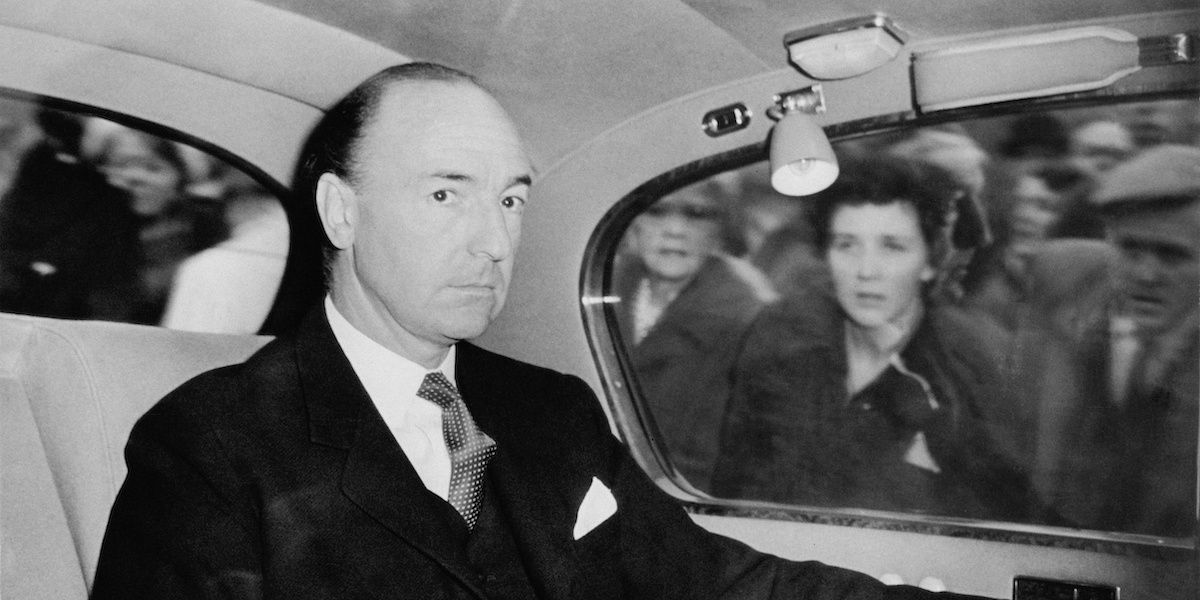On 5 June 1963, sixty years ago, British Secretary of State for War John Profumo resigned from government and from parliament in what is still considered the biggest political sex scandal in UK history. . Profumo had lied to parliament about his extramarital affair with Christine Keeler, a model who was also having an affair with an alleged Soviet spy, suspected of wanting to extort confidential information from the minister through the woman. The case was covered extensively in the newspapers, got everyone involved into trouble and brought into disrepute the Conservative government of Prime Minister Harold Macmillan, who eventually resigned as well.
As historian Peter Hennessy has said, the Profumo scandal continues to attract attention even decades later because it «a story that has it all»: from sex to the end of a political career, from judicial trials to the Cold War, and it happened at a time, the 1960s, when the United Kingdom was rapidly changing in customs, fashions and habits.
Profumo met Keeler a a pool party in a luxury residence in Cliveden, west London, on 8 July 1961: he was 46 years old, one of the most prominent Conservative politicians and married, while she was 19 and already a model and showgirl rather known in the English capital. She introduced them to Stephen Ward, an osteopath who had connections both in the London aristocracy and in local political circles and alleged prostitution rings. Also at the party was Yevgeni “Eugene” Ivanov, a Soviet naval officer who worked as a diplomat at the embassy in London: he was Keeler’s lover and was suspected of being a spy.
Keeler and Profumo began dating but their relationship was interrupted after a month and a day, when the British secret services informed the minister that the woman had a connection with Ivanov, an alleged spy for the Soviet Union, at the time an enemy of the United Kingdom. Rumors about the relationship began to circulate in the newspapers just over a year later and in March 1963, when the news of the relationship with Keeler was now public, Profumo denied in the House of Commons (the lower house of the British parliament) that he had “unsuitable” relationship with her. Under mounting pressure from the Labor Party, however, on 5 June she confessed “with enormous remorse” to her liar, so she resigned from government and parliament.
Christine Keeler in a photo dated July 22, 1963 (AP Photo/ ro/ stf/ N.)
Profumo was overwhelmed by the affair along with the entire Macmillan government: not only because of the extramarital affair and the possible implications for national security, but also because the minister had lied to parliament, and according to critics the government was not tough enough in his comparisons. The affair had a huge impact on British society, mainly due to the great attention given to it by newspapers in the summer of 1963. Among other things, the tabloid Sunday Mirror published the letter in which Profumo had ended the affair with Keeler. At the same time, rumors began to circulate of alleged sexual liaisons and orgies involving other ministers, aristocrats, actresses, actors and even members of the royal family.
To try to handle the situation, Macmillan’s government appointed Lord Denning, a well-known judge, to carry out an inquiry on the scandal: after three months a small volume was published which was much cited by the country’s newspapers and sold almost 100,000 copies in 24 hours. Although Lord Denning’s report ruled out any risk to UK security, Macmillan’s government was accused that he wanted to cover up the scandal and that he tried to protect Profumo’s reputation and his own, and came out of it greatly weakened.
Despite suspicions of espionage, neither British intelligence nor the FBI could ever prove or disprove that Ivanov had tried to use Keeler to get information from Profumo. For many critics, however, the scandal marked the end of an era where conservative politicians or otherwise people of high society could do what they wanted without any media attention and without any consequences. Profumo’s resignation was followed by Macmillan’s, forced to leave his office in October 1963 due to great pressure from his party, which ended up being defeated by the Labor Party in the following year’s elections, albeit with a narrow margin. margin.
The scandal became so notorious that today the Cliveden residence, which has become a hotel, offers guided tours paid in the place where one of the most followed political scandals ever began. The case was reported in 1989 in film Scandal – The Profumo case, whose soundtrack sung by Pet Shop Boys and Dusty Springfield was titled “Nothing has been proved”. More recently, however, it has also been mentioned in the TV series The Crown, which tells the story of the British royal family during the reign of Elizabeth II. In 2020, fifty years after Profumo’s resignation, up BBC 1 it then aired The Trial of Christine Keelera fictional dramatization of the story that was received positively by both audiences and critics.
Yevgeni Ivanov, the alleged Soviet spy, returned to Moscow before the scandal exploded: he continued to hold high-level public posts, but remained rather aloof. Stephen Ward, the osteopath who had introduced Keeler to Profumo, was tried for pimping: he committed suicide with a dose of barbiturates on the last day of the trial. Also tried was Keeler, who was sentenced to nine months in prison for perjury for fabricating an assault, and after her notoriety in the 1960s she lived a long time under an assumed name. Profumo, on the other hand, never spoke publicly about the affair again: he showed up on rare occasions and devoted himself to some charitable activities until his death in 2006.
– Read also: Who really was the alleged murderer of the ‘Bulgarian umbrella case’
